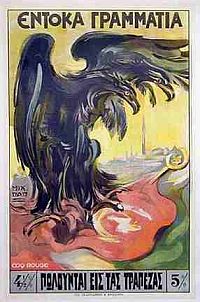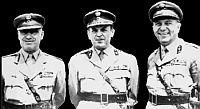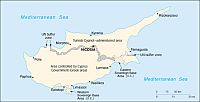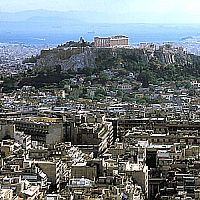- About Us
- Columns
- Letters
- Cartoons
- The Udder Limits
- Archives
- Ezy Reading Archive
- 2024 Cud Archives
- 2023 Cud Archives
- 2022 Cud Archives
- 2021 Cud Archives
- 2020 Cud Archives
- 2015-2019
- 2010-2014
- 2004-2009
 |
The Cud On History: Causes & Legacy of the Greek Military Junta 1967-1974 |
To understand what factors contributed to military rule in Greece from 1967 to 1974, it is essential to examine the history of Greece in the twentieth century — one of limited economic and social development, marked by one crisis after another, hindering progress and the attainment of political stability. After ridding itself of Ottoman rule in the 1820's, by the early twentieth century Greece was troubled by political rivalries and a disastrous war with Turkey. In 1936 a military dictatorship, tolerated by the monarchy, was set up under General Metaxas. Metaxas attempted some positive social reforms, but on his death in early 1941 Greece fell to Italy and came under German occupation. Greece therefore shared many of the problems that Italy was experiencing in this period, including poverty, a lack of resources and strong development, and political instability.

Greek propaganda poster
Opposing fascist rule, communism emerged in Greece in the 1940's in the form of the National Liberation Front (EAM) and its military offshoot, the People's Liberation Army (ELAS). In 1944, however, communist rule was hindered in two ways. First, George II, in exile in Cairo, was British backed, and troops were sent to Athens under General Ronald Scobie to keep Greece out of communist hands. Second, Stalin, eager to control Eastern Europe, made a deal with Britain that granted him primary influence over Bulgaria and Romania if Britain could retain primary control over Greece. Under Soviet pressure, EAM reluctantly joined a coalition under the moderate, king-appointed George Papandreou.
This unstable coalition did not last, however, and by October 1946 civil war had broken out. War lasted until October 1949, the communists eventually losing primarily due to poor tactics and acts of terrorism which alienated their supporters, and due to minimal international aid. The impact of the war was considerable and marked the emergence of US involvement in Greek politics and Greek entry into the Cold War conflict. The Civil War tied Greece to many international organizations such as the OEEC, the Council of Europe, and NATO (1952), with some economic improvement (but not a sufficient amount of industrial development) provided under the Marshall Plan.
After the civil war a period of relative stability followed, particularly under the unprecedented eight-year rule of Constantine Karamanlis, leader of the Radical National Union party. By 1963, however, problems had again emerged: the communist/right-wing tensions continued, economic measures aimed at reducing inflation provoked an attempt at a general strike in 1953, and most industrial development was often foreign owned. The reliance on tourism and the export of cheap labor further highlighted underdevelopment, and the loyalty of the army to the government was maintained at the cost of devoting one-third of the budget to military spending. Karamanlis' attempts at European Community (EC) membership were limited to the granting of ‘associate status’ in 1962, and relations with the US and Britain soured after 1955, due to resentment of foreign influence, but primarily due to unrest in Cyprus.
Cyprus was to remain a serious problem in the Greek historical experience. The island was inhabited by Greeks -who made up eighty percent of the population- and Turks -who constituted twenty percent. The Cypriot Greeks desired self-determination from the colonial rule of Britain and union with Greece. This worried Britain and when Karamanlis looked to communist Eastern bloc countries for sympathy, the United States also became agitated. The conflict eventually led to independence being granted in 1959 under the leadership of Archbishop Makarios, but without union. This intensified Greek-Turkish tensions, and the United Nations had to be sent in to maintain peace. The Cypriot issue further led to Karamanlis' own resignation in 1963 in protest to the continued close relations between the Greek and British royal families. A left-wing coalition took control, but in February 1964 the dynamic George Papandreou and his Greek Union party were in power. In the same period Constantine II was handed the Greek throne.

The key leaders of the junta — Papadopoulos is in the centre
These events promised positive development, however the rise of Papandreou marks the emergence of the immediate causes of the military regime and a new instability in Greece. This instability was especially marked by the new government's alienation of the military, first by cutting defense spending, and second through the accusations that Papandreou's radical son Andreas was tampering with the army by encouraging the formation of a secret society sympathetic to his aims. George Papandreou dismissed his minister of war before any public trial could take place. The military establishment was further concerned by what they saw as Papandreou's forgiving attitude towards the communists. Under Papandreou's leadership social services were improved, but this came at the cost of high inflation, and conflict between Papandreou and the King refueled the monarchy-republican divisions, eventually leading to Papandreou's resignation in July 1965. In a somewhat tactless move, Constantine put Papandreou's deputy into power, splitting the loyalties of the ruling party and rendering the government virtually ineffective. Strikes and demonstrations followed, and Papandreou seemed destined to win the next elections (which would have seriously threatened the best interests of the military).
As a direct result, on April 21, 1967, a group of army colonels led principally by George Papadopoulos seized power in Athens— claiming to have forestalled a communist plot, but more likely to prevent the victory of Papandreou. The leaders of the regime claimed that they were acting in the best interests of Greece, but anyone who opposed their goals was essentially considered part of the evil foreign influence. The colonels immediately set up martial law, suspended parliamentary government and democratic freedoms, and exiled or arrested their opposition including, for a time, George Papandreou. When George died in 1968 his son Andreas left Greece and Constantine Karamanlis also went into exile. Constantine initially accepted the regime so long as they would push for an early restoration of the democracy, but after he failed in his own attempt to take power, he too was exiled and the military leaders tightened their restrictions and controls. The United States saw Greece as an effective barrier to the Soviet influence, and recognized Greece’s strategic geographic value as a location that would suit the establishment of bases and intelligence networks, and as such they were the major foreign supporter of the regime. With this support the regime was initially successful, also benefiting from the support of certain industries (such as the ship-owners) and some popular measures, including the increase of pensions and the setting up of price controls.
Problems, however, soon emerged. Domestically, censorship, the secret police, imprisonments, and particularly torture tactics met with increasing criticism. Internationally, such methods led to protests and eventually Greece's expulsion from the Council of Europe. The colonels showed incredible naivety in terms of underestimating the degree of foreign outcry that would be generated by their actions. In 1973 a constitution was introduced via a rigged referendum, setting up Papadopoulos as Prime Minister, and after June, when the exiled king was accused of making another failed attempt to return to power, the monarchy was abolished and Papadopoulos became President. These developments now raised concerns, particularly about Papadopoulos' increasing personal power and the lack of substantial economic and social improvements in return. Inflation continued to skyrocket. Opposition to the regime peaked in November 1973 after student unrest in Athens was brutally put down, convincing some sections within the military that the regime had lost sight of its original aims,  and they removed Papadopoulos. The presidency was handed to General Gizikis but the real power lay with the coup's engineer, Brigadier Ionnidis. The second military regime did not last, however, principally due to its inability to deal with the new crisis in Cyprus.
and they removed Papadopoulos. The presidency was handed to General Gizikis but the real power lay with the coup's engineer, Brigadier Ionnidis. The second military regime did not last, however, principally due to its inability to deal with the new crisis in Cyprus.
In July 1974 Greek Cypriot extremists failed to overthrow Archbishop Makarios and anarchy ensued. In response Turkish troops launched an invasion of Cyprus and effectively partitioned the island. Greece's NATO allies America and Britain failed to come to her aid, and hopes for Cypriot union with Greece now seemed unattainable. Whereas union would have boosted the credibility of the new regime enormously, Greeks could not comprehend how the colonels could have been so incompetent to let part of Cyprus fall into Turkish hands. On 24 July President Gizikis called on the veteran conservative Karamanlis to return and lead a new civilian government. Karamanlis was seen as the only politician who, with his wealth of experience, could lead Greece out of this regrettable situation.
Three reasons for the ultimate demise of the regimes can be identified in retrospect. They are: first, the impact of opposition to the regime, whether of students, intellectuals, or labor leaders; second, the defection of certain elements of the military; and third, the most critical fault of the regimes — their failure to solve pressing economic and social problems and the Cyprus issue, which was a source of considerable emotion among the Greeks.
Since 1974 the new democratic regime has struggled to maintain stability, marred by economic fluctuations, political party faction fighting, and international developments. Karamanlis was able to restore some superficial stability in Greece to the extent that he restored the 1952 constitution, re-legalized the communist party, and held free elections, from which he emerged victorious with his New Democracy party in November 1974. Stability was also precipitated by the referendum decision in December to end the monarchy, thus ending a long source of conflict in Greek politics. Karamanlis encouraged private enterprise and instituted a number of social reforms, and in 1979, having resumed close relations with the US and the rest of Europe, Greece was admitted to the EC (now the European Union).
In the late 1970's Andreas Papandreou re-emerged as leader of the socialist party PASOK, the main opposition to Karamanlis' government. Though this clear two-party system encouraged stability, Papandreou's subsequent domination of Greek politics in the 1980's, and conflict with Karamanlis and other parties continued. In March 1985, for instance, PASOK refused to accept the re-election of Karamanlis as President, and in protest the latter resigned. Though PASOK did introduce a number of long overdue reforms in the 1980's (including the right to civil marriage, lowering of the voting age to 18, credit controls and increased spending on social services) high inflation and unemployment, low investment and trade difficulties prevailed. When many other Western European states were emerging from the slumps of the 1970's, the Greek government was forced to freeze wages and salaries, and deal with a huge problem of tax evasion whilst heavily depending upon EU funding and support mechanisms. The New Democrats governed briefly in the late 1980’s before Papandreou took power, but after his resignation in 1996 Costas Simitis led the nation for eight years through a period of relative prosperity marked by a reduction in inflation and  considerable modernization. After Simitis’ retirement in 2004, Kostas Karamanlis and the New Democrats defeated PASOK. They remain in power to this day. Aside from ongoing, pressing domestic matters, internationally Greece is still faced with the reality of a reduced value to the Atlantic alliance, the ever-present risk of instability in the region, and the traditional antagonism between Greece and Turkey, more recently over territorial rights in the Aegean.
considerable modernization. After Simitis’ retirement in 2004, Kostas Karamanlis and the New Democrats defeated PASOK. They remain in power to this day. Aside from ongoing, pressing domestic matters, internationally Greece is still faced with the reality of a reduced value to the Atlantic alliance, the ever-present risk of instability in the region, and the traditional antagonism between Greece and Turkey, more recently over territorial rights in the Aegean.
Despite the threat of instability in the Greek democracy, it seems unlikely that the military could ever pose a threat again. Since 1974 the reputation of the military has been restored, and those principally involved in the coup were either imprisoned or removed. Strong Greek nationalism and the Turkish issue mean that there will always be wide support in Greece for the military so long as they stay well out of the political arena. The only questionable military issue today is how such a relatively poor country can continue to spend such a considerable amount on defense. That this spending is often done without opposition may suggest some degree of underlying concern to keep the military in check. Whilst instability in society, economics, and most importantly in politics marked the rise of military dictatorship in 1967, after the fall of the regime, Greek democracy is still at risk of instability. Many sources of trouble such as the monarchy have been eliminated, but Greece continues to struggle with domestic and international problems, exacerbated by underdevelopment in comparison to the rest of the EU — yet it must be noted that this situation has been markedly improved over the past ten years.
References:
Richard Clogg, A Short History of Modern Greece, Cambridge, 1992.
C. M.Woodhouse, Modern Greece: A Short History, London, 1991.
